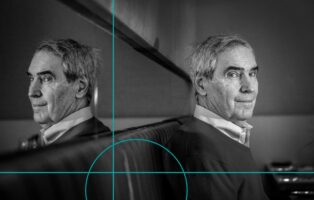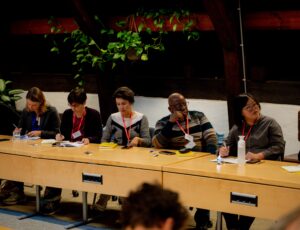What if we would study and re-conceptualize Belonging as not always fixed or place-bound but rather as mobile? Can looking from mobility provide for alternatives sources for belonging? What is at stake, for whom, and when? When or where does belonging ‘work’, and why?
This second NIAS conference in the domain of ‘Studies of Belonging’ staged presentations of researchers, artists, writers and journalists. We brought together a diverse and inclusive community of people working on ‘Belonging & Mobility’, and in doing so, provided a platform for the wealth of interdisciplinary and international collaborations active on the topic.
On Belonging & Mobility
The NIAS Conference looked to unpack ‘Belonging’ as understood from a static default, and instead to inquire into, and re-conceptualize, belonging as not singular and place-bound but rather as a process or a doing. Can looking from ‘Mobility’ provide for alternatives sources for the Studies of Belonging?
Theories and practices of belonging tend to often operate from the default of stasis, where those who were here first belong more than others, and have a greater say over newcomers to ‘their’ world. In this default, mobility appears as the antithesis of belonging. In this default, mobility can only be considered as undesirable as those in search of new belongings are held to disturb pure, original, native places and cultures of belonging.
And yet mobility is what qualifies and troubles our world perhaps more than ever. People, just as other species, are always looking to find new arrangements to contribute and belong, either in the form of temporal moorings and dwellings, or by rooting more substantially to specific places, cultural arrangements, practices and imaginaries.
Still, the possibilities to move and belong as well as how they are appreciated, are unevenly distributed. For newcomers, migrants and refugees, searches for belonging seem to be increasingly precarious, contested, resisted, made difficult or exclusive. Welcomes are often fraught and hard. Others – frequent flyers, mercenaries, celebrities, capitalists in search of tax havens – find borders and boundaries to be less merciless.
For some ‘natives’ it is harder to welcome newcomers than for others. Particularly when the newcomers compete with these ‘natives’ regarding scarce goods, such as housing and work. It therefore makes sense to further unpack mobility, and to distinguish between physical, social, cultural and virtual mobility. Particularly those ‘natives’ who lack social and physical mobility feel threatened by mobile people (mobile both in the sense of physical as well as social/economic mobility).
Can looking from mobility provide for alternatives sources for belonging? What would it bring to conceptualize belonging as multiple, as temporal, as potentially mobile? Would we need other (mobile) methods to study such processes? And might such rethinking of belonging for a mobile world bring new insights and hopes for discourses and practices stuck in stasis, and for their related harsh polemics?
About the Spheres
The conference was structured around five ‘spheres’ where important narratives and practices of belonging are being negotiated and rendered (im)mobile. Each of these was curated by a renowned scholar in the field. And for each of the spheres, we looked to unpack their ‘immobile’ default as well as investigated what it would bring to rethink the work of belonging which people, and other species, undertake as fundamentally related to modalities and infrastructures of mobility. The spheres are:
- The Body Politic
- Belonging as / at Work
- Dwelling / Home-ing
- (Re)making Public Space
- Ecologies of Belonging
For more elaborate information about the five spheres, please click here.
About NIAS
NIAS’ mission is to foster curiosity-driven research that pushes the traditional disciplinary boundaries and questions underlying methodological and theoretical assumptions. Each year, NIAS hosts an international, interdisciplinary group of 50 fellows who work on their independent research projects while being embedded in a thriving intellectual community.




